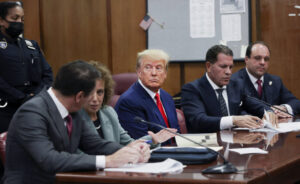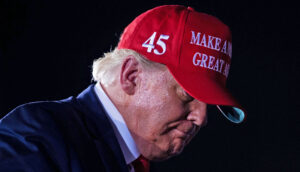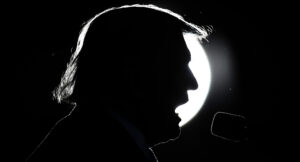Coffee County, Georgia
Coffee County, Georgia, seems an unlikely setting for espionage. It sits far from the intrigues of Washington, far from the coming politico-criminal trials in Atlanta. Far, in a sense, from anywhere.
As they jetted in in January 2021, the team working on Trump’s behalf might have noticed the openness — the emptiness — of the landscape: now the gold of hay fields, now the green of peanuts. They touched down at the tiny airport where, just outside the runway fence, an apparently crashed passenger plane sits decaying, nose in the soil. On the main road they passed Harvey’s grocery, and The Painted Lady antiques shop. In downtown Douglas, the county seat, they met the Coffee County elections director, Misty Hampton. And today they’re under indictment for tampering with the literal machinery of democracy; for conspiring, in the end, to overthrow the will of the American people.
“It would seem like a lot to clean up,” Hampton’s successor, Christy Nipper, said this week. She sat in a small and spartan office, bristling with determination to restore the public trust. She’s had the job a little over three weeks. “I’m learning a lot.”
Over her shoulder, like a portrait of the Pope in a Catholic home, a picture of Georgia Secretary of State Brad Raffensperger surveyed the room. The Secretary sent someone recently to do what Nipper called a “health check”, making sure Coffee County’s voting machines are maintained and kept secure.
“I do my best to be completely honest and transparent,” Nipper said. She meant that figuratively, in the sense that when her assistant is out she answers the phone herself, and will listen to anyone’s concerns. But she also meant it literally.
She jumped up from behind her desk and strode outside her office, where she faced a blank wall. In a room on the other side is where the business of modern vote counting — memory cards and flash drives and secured computers — happens. And in two days, the day before Trump surrenders himself to authorities in Georgia, Nipper will knock a hole in that wall to install an enormous window for the public.
“It’s gonna be four foot, top to bottom, and six foot wide,” she said. “They can stand here and watch.”
I’m reminded of an election worker named Lawrence Sloan, with whom I had spoken in Atlanta. Late on election night, 2020, he had been feeding ballots into an envelope-opening machine. When a tiny blade in the machine nipped his fingertip, he sat back and raised a middle finger in a salute to the machine. It had nipped him because a voter had left the voting instruction sheet in the envelope, so Sloan balled that up and tossed it aside. Then he leaned in close to the machine and whispered. “Oh, fuck you,” he said. “Do not do this to me right now; it is too fucking late. We have a better relationship than this.”
Several hours later he got a message from a friend: Have you seen this video? The link showed Sloan arguing with the machine and tossing away the paper. Someone had recorded it, added narration, and posted it. “I wonder what’s going on here,” the narrator says. “If that’s not voter fraud, I don’t know what is.”
In the hours that followed, more than five million people watched the video online, television news showed it, and threats rolled in from around the world. Sloan fled the count across downtown Atlanta, and ended up in hiding for weeks. All because someone could view and record him doing mundane envelope work. So in an electorally crucial state like Georgia — and beyond it the full United States — is transparency enough?
Nipper returned to the desk. Her short hair is the colour of steel, and she wore her plaid shirt with the sleeves rolled up. Trump would arrive soon in Georgia, she knew. The coming trial will mark one of the most furious political battles in the history of the United States. She knew that, too.
“The world is watching,” she said. “I’ll let ’em see it all.”
***
Meanwhile, in Atlanta, satellite trucks surrounded the Fulton County Courthouse. Television reporters camped under tents, sweating, struggling to keep hair and makeup from wilting in the heat. The sun conspired against them with the pavement and granite of downtown Atlanta. Temperatures on the streets reached more than 43 degrees Celsius.
In a culture that wrings every salty droplet from its political news, this is something unprecedented: a former American president indicted by a state for election meddling. His attorney and alleged co-conspirator, Rudy Giuliani, pioneered the anti-racketeering techniques that now ensnare both of them and 17 other defendants. Fulton prosecutor Fani Willis has assembled a case that sweeps from the heights of American power down to those humble peanut fields.
Trump’s own trial is likely to centre on his famous phone call to Secretary of State Raffensperger. In that conversation, Trump leaned on Raffensperger — whose office oversees elections in Georgia — to “find” more than 11,000 votes that he needed to win the state.
The indictment also accuses lesser-known figures, such as Trevian Kutti, whose story Mark Bowden and I revealed in The Steal, about efforts to overturn the election. She’s a Chicago publicist who had worked for Kanye West, but travelled to Georgia and pressured an election worker — a grandmother named Ruby Freeman — to confess fabricated election crimes. Freeman refused, and suffered a campaign of harassment online and on her doorstep.
In a twist unique to the American electoral system, the indictment also includes several “fake electors”: people such as David Shafer, former chair of the Georgia Republican Party, who met at the state capitol with other Republicans and signed a false Electoral College document. That is, they certified to the US Congress that Trump had won their state, instead of Biden. The indictment charges him with forgery and impersonating a public officer, among other things; Shafer has since claimed he was acting at Trump’s behest.
The indictment is a vast, wide-ranging thing that feels difficult to see all at once. But viewed as a whole it presents Georgia as a prize to which Trump felt entitled. For decades the state has voted Republican, and in 2020 its flip from red to blue shocked anyone — maybe including Trump — who wasn’t familiar with its deeper history. But for many years Georgia has undergone a demographic shift that made the flip inevitable, and that same shift has now culminated in a unique threat for Trump.
Georgia’s trajectory started at the very beginning, with an Englishman. Early in the 18th century, James Oglethorpe sailed from Kent to found the new colony according what was then a radical set of principles: Georgia should provide a haven for the oppressed and “unemployable”. Colonists should deal fairly with Native Americans. There should be no slaves.
Oglethorpe’s vision was imperfect, and generations of economic pressures corrupted it. Even so, Georgia carried a strand of plurality in its DNA that its neighbouring states never had. And after the upheaval of the Civil War, that strand emerged. “Georgia saw the emergence of a strong black community during Reconstruction and afterwards,” according to Audrey Haynes, a professor of politics at the University of Georgia. Black universities came to life. Black businesses thrived. Black citizens rose to power in government — including the district attorney’s office.
Atlanta calls itself Black Mecca, but Georgia has expanded beyond that now, to become a beacon for immigrants of all types. In 1990 about 170,000 Georgians were born overseas; by 2021 more than a million were. The state has become, according to Haynes, “a place where, despite national politics and the conflicts that have emerged, most of these communities work together”.
Some of the state’s politicians have fallen to the temptation of polarising, tribal national politics, she said, where victory matters more than principle. But just enough haven’t: just enough leaders, conservative and liberal, have held on to Oglethorpe’s vision of cooperation over conquest.
***
The heat continued to rise throughout the week, in Georgia.
Two days before the former president’s arrival, two conservatives — both key figures in Georgian politics — met at a coffee shop in Vinings. Jordan Fuchs and Gabriel Sterling sat outside, tucked into the shadow of the cafe. They spoke in the confidential tones of people who have survived a war together.
“I’m starting to enjoy that we played a part in these — these events,” Fuchs said.
“You are now,” Sterling shot back, grinning. “You weren’t, then.”
Fuchs is the deputy Secretary of State, and was present for Trump’s fateful phone call to her boss, Brad Raffensperger. Sterling is the chief operating officer for the Secretary, overseeing elections. Back in December 2020 — during the strange twilight after the elections and before the January 6 riots in Washington — the pair had sat at a different table, having lunch together when someone forwarded Sterling a social media post. In it a Trump supporter claimed a young election worker had been “caught committing treason”, and named him. The post included a video of a noose slowly swinging in the wind.
“I’ve got to do something,” Sterling had told Fuchs, at the time. They called a press conference on the capitol steps, and Sterling spoke. “I am going to do my best to keep it together,” he said, drawing out each word, “because—it—has—all—gone— too—far. All of it!” He cited multiple instances of violent rhetoric, including from people working on Trump’s behalf. “This is elections. This is the backbone of democracy. And all of you who have not said a DAMN WORD are complicit in this. It’s too much.”
Then Sterling addressed the president directly, in words that would prove prophetic on January 6: “Mr. President, it looks like you likely lost the state of Georgia. We’re investigating. There’s always a possibility, I get it, and you have the rights to go through the courts. What you don’t have the ability to do, and you need to step up and say this, is stop inspiring people to commit potential acts of violence. Someone is going to get hurt, someone is going to get shot, someone is going to get killed. And it’s not right… It’s un-American.”
His voice rang against the walls of the capitol atrium: the sound of divisive national politics crashing into the bulwark of Georgia. After the press conference, Raffensperger called Sterling and Fuchs. “Well,” he said, “You didn’t tell me you were going to say that.” Afterward threats from around the world escalated until members of the Secretary’s staff kept bullet-proof vests within reach, at the office.
Now, over their coffees, Fuchs and Sterling ponder how to avoid disaster in 2024. “The problem with transparency without education is that people see things they don’t understand,” Sterling said.
But the problem runs deeper, he said. You can’t educate people out of bad intentions. “We’re more disconnected than ever before. Covid exacerbated that. People don’t go to church as much. That used to be a great balancer. You could be a bricklayer, a butcher, a lawyer, a doctor — you went to a church together,” he said. “Now it’s easier to be meaner.”
That quality — the meanness — makes any civic undertaking, like an election, feel impossible. “There is a flaw in this,” Fuchs said. Lying pays. Politicians can turn a loss into a cascade of donations, if they persuade voters an election was stolen. “You can be the most transparent. You can do the best job in the world. But still.”
Audrey Haynes, the professor, later agreed with Fuchs’s sentiment. “You will never generate trust among those who do not want to believe,” she said. James Madison, the architect of the US Constitution, “understood that institutional design was important to keeping any governing or related body operating with integrity. But it also requires that we pledge ourselves to principled behaviour. If leaders do not then they may gain in the short run but we all lose in the long run.”
Fuchs and Sterling emptied their coffee cups. The heat drained away conversation, and the old friends parted ways.
As he walked away Sterling mused on whether Trump would pose for a mug shot. “If they do, he’ll make a t-shirt of it.”
***
The former president has many opponents, but none has ever accused him of anticlimax. On Thursday, he arrived in Atlanta somehow embodying both gravity and bombast, like a monarch landing in hostile territory.
“Thank you very much,” he told the press, as he descended the stairs from his plane.
From the airport his motorcade forayed into a different Georgia, far from the open fields of Coffee County, or the granite cleanness of downtown Atlanta, and an infinite distance from the decorum of the White House or even the golden crust of Mar-a-Lago. The once-president visited a neighbourhood dominated by chain link fences and liquor stores, loops of barbed wire and payday lenders. At the centre of it loomed the Fulton County Jail, although no one here uses that name. They know it as Rice Street Jail, one of the worst in the nation. The US Department of Justice recently opened an investigation into the jail, after an inmate’s dead body was found infested inside and out by insects.
Trump’s arrest — in that neighbourhood, at that jail, submitting to fingerprints and yes, the mug shot — is singular in American history. A sordid moment, regardless of party. But the expectedness of the situation — moving a former president in and out of a known location, at an anticipated time — required a massive display of Secret Service, state police, local sheriff’s deputies, SUVs and motorcycles, two ambulances, drones overhead, lights and sirens: a spectacular eruption of power and protection. Trump, possibly for the last time, moved through the world like a current head of state.
Atlanta, though, also prepared for the moment. The mood on the street, as Trump surrendered himself, seemed festive. A nearby nightclub called Suite Lounge had created a flyer featuring Trump in an orange prison jumpsuit. “Free hookah for ladies,” it read. The club posted the flyer on Instagram, set to a song by rappers Jermaine Dupri and Ludacris:
“Welcome to Atlanta.”
Disclaimer
Some of the posts we share are controversial and we do not necessarily agree with them in the whole extend. Sometimes we agree with the content or part of it but we do not agree with the narration or language. Nevertheless we find them somehow interesting, valuable and/or informative or we share them, because we strongly believe in freedom of speech, free press and journalism. We strongly encourage you to have a critical approach to all the content, do your own research and analysis to build your own opinion.
We would be glad to have your feedback.
Source: UnHerd Read the original article here: https://unherd.com/







